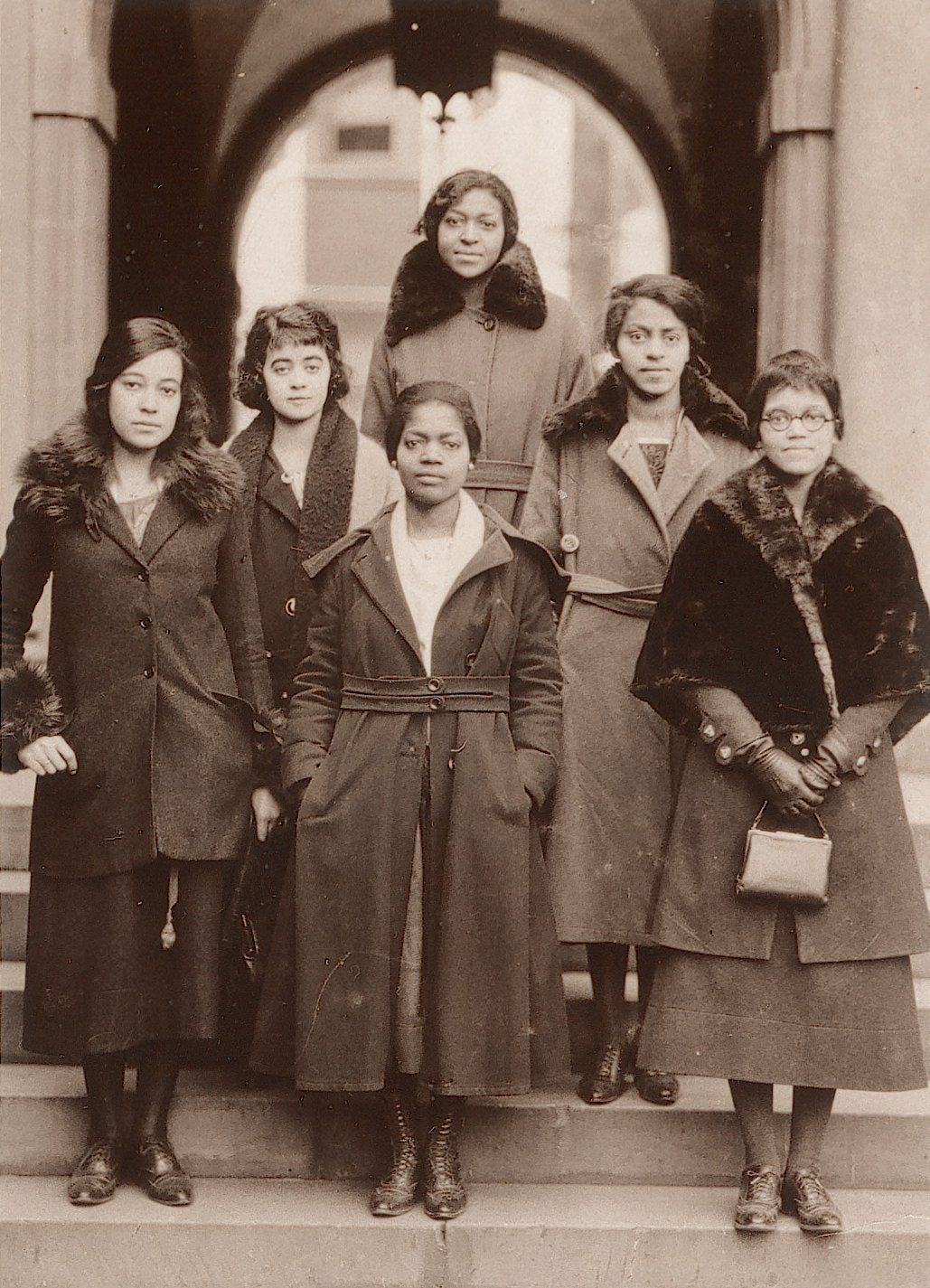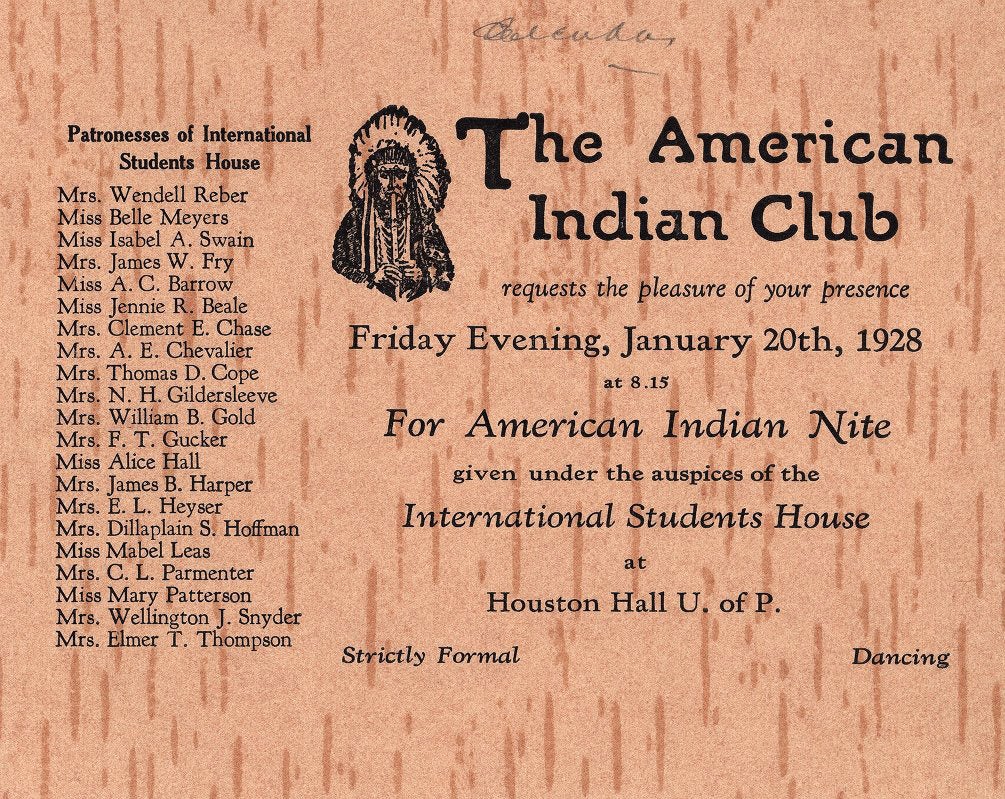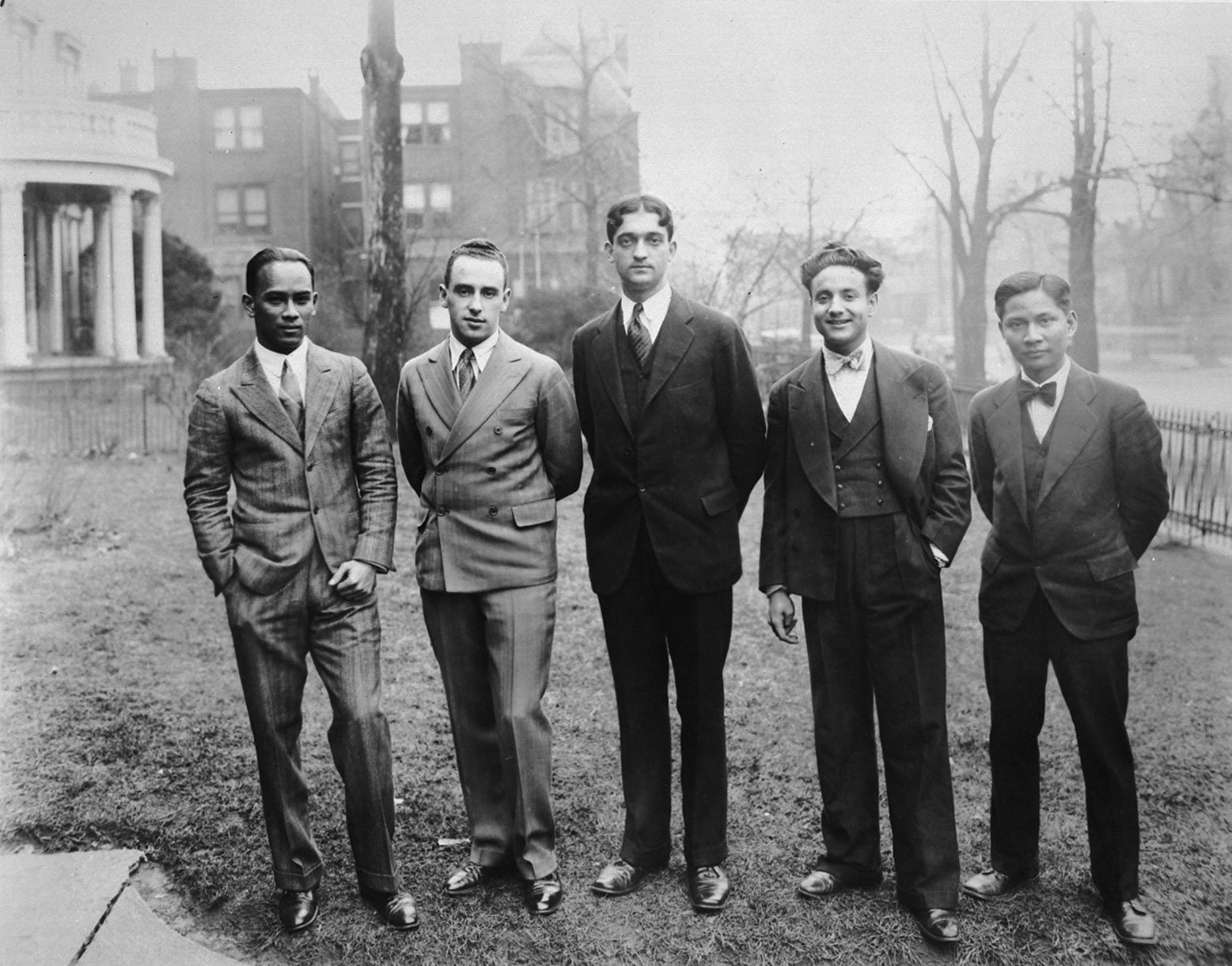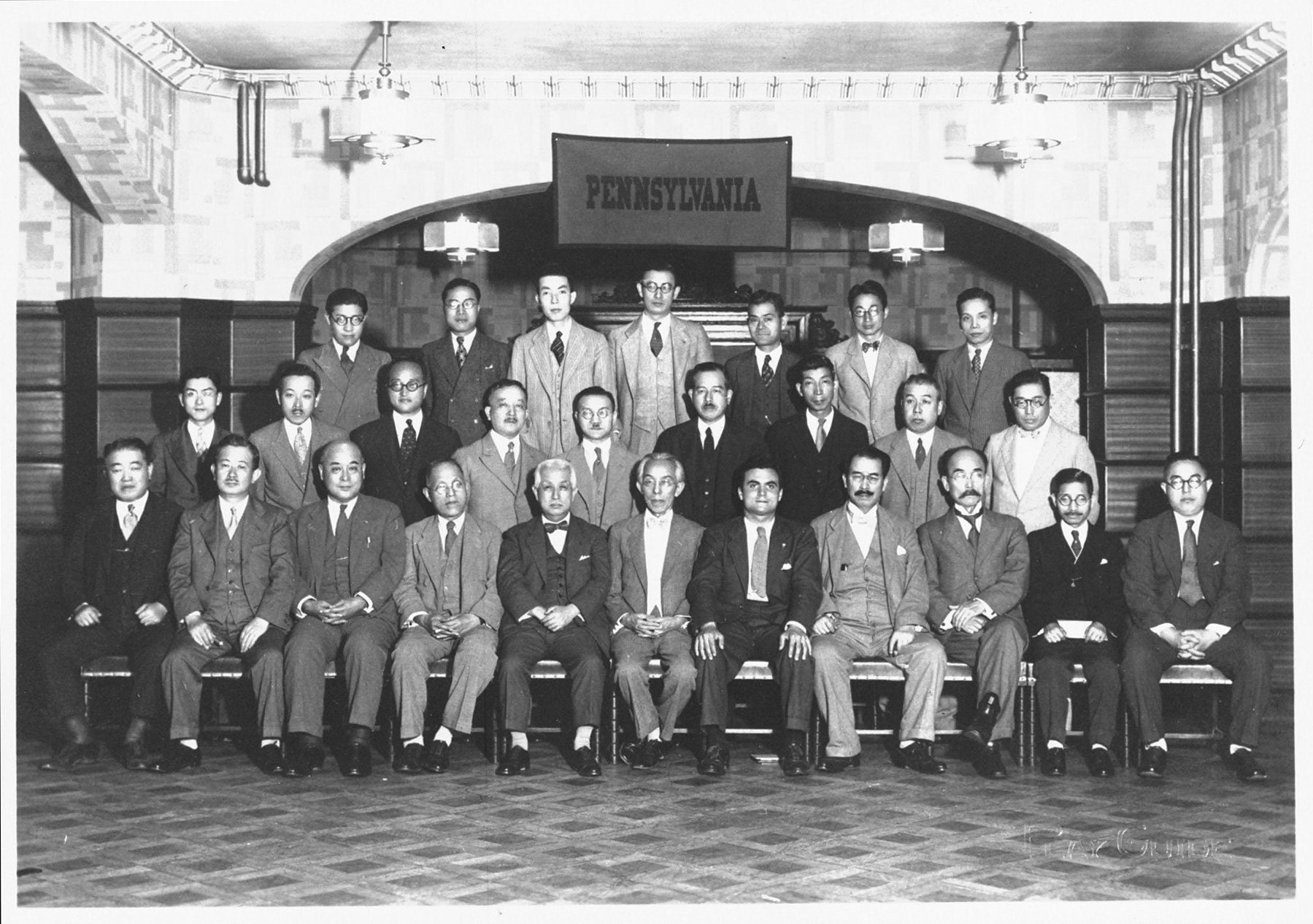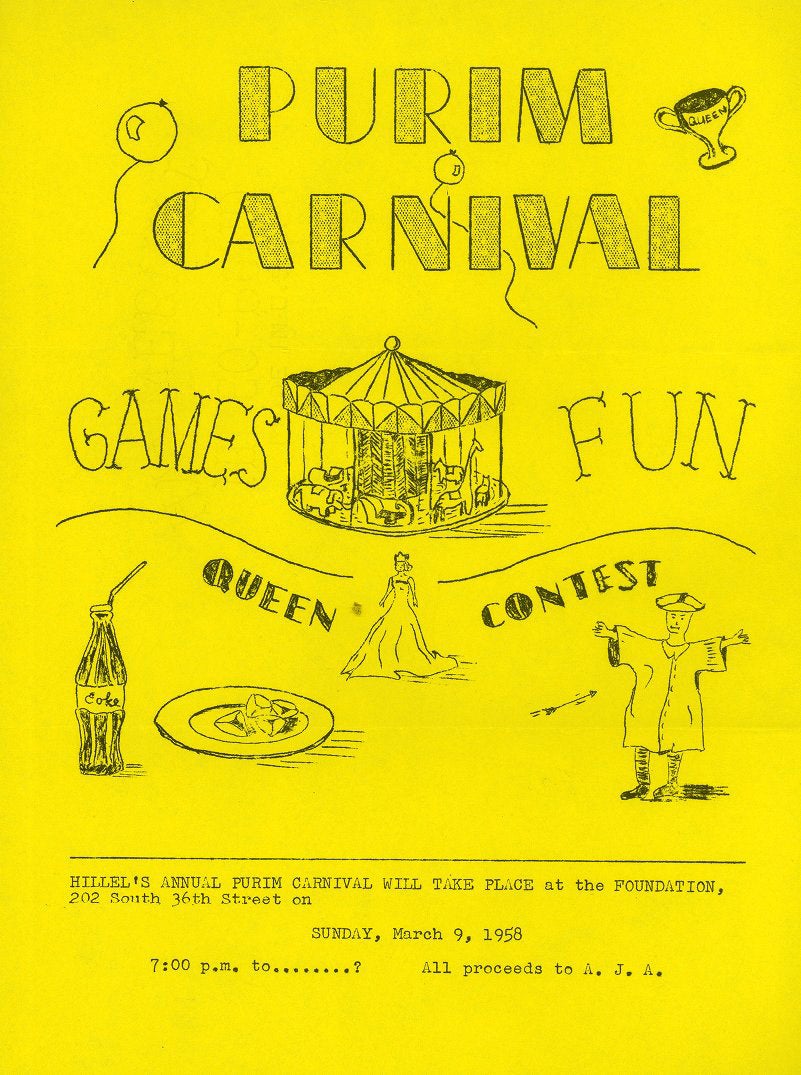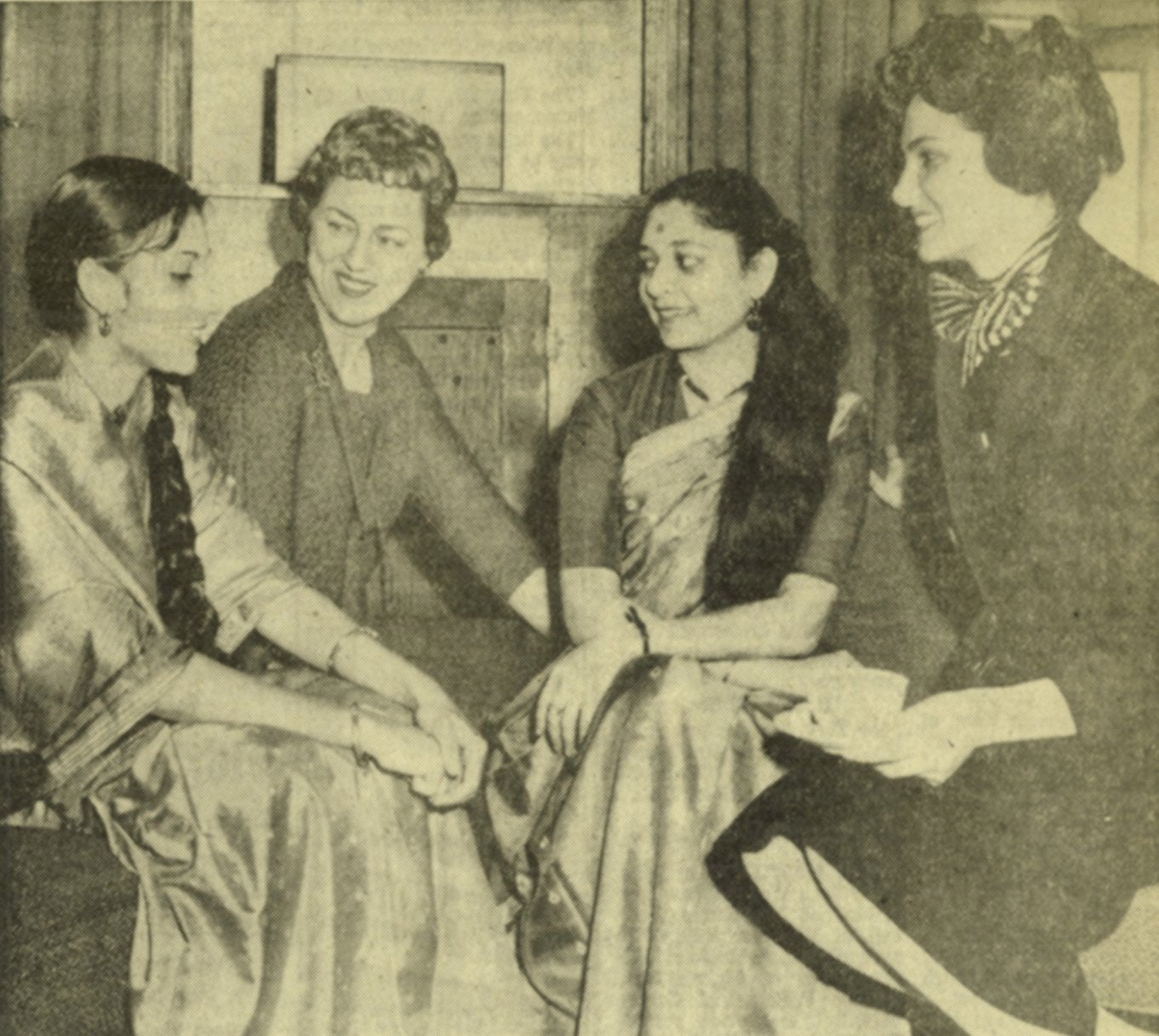“We have an enrollment at the University of 12,000 students, who have registered from every State in the Union, and 253 students from at least fifty foreign countries and foreign territories, including India, South Africa, New Zealand, Australia and practically all the British possessions except Ireland; every Latin American country, and most of the Oriental and European nations.”
George E. Nitzsche
1921
| 1916 | George E. Nitzsche wrote, “The medical school, from its inception has always attracted students from many parts of the world.” |
| 1917 | The Christian Association (CA) of the University of Pennsylvania purchased property at 3905 Spruce Street from the heirs of Joseph Potts. The house opened January 1, 1918, as a home for foreign students. |
| 1918 | Philadelphia’s International Students House opened.
As captain of the cross country team Willis Nelson Cummings was the first African American captain of an Ivy League sports team. The following year Cummings graduated from the dental school ranked sixth in his class of 259 students. The Gamma Chapter of the Delta Sigma Theta sorority was established at Penn, the first African American sorority. Sadie Tanner Mossell Alexander graduated from the University of Pennsylvania with a Bachelors of Science in Education. Mrs. Alexander continued her education at Penn earning a Ph.D. in Economics (1918) and J.D. from the Law School (1927). Mrs. Alexander was one of the first two African American women in the nation to receive a Ph.D. and the first to do so in economics. At Penn Law she was the first African American woman to graduate and the first admitted to the Pennsylvania Bar. |
| 1919 | The Graduate School of Medicine was founded. |
| 1920 | The School of Fine Arts was established.
Psi chapter of the Alpha Phi Alpha African American fraternity founded. Raymond Pace Alexander graduated from the Wharton School and later Harvard Law School. Alexander, a renowned Philadelphia lawyer, argued a number of cases concerning racial discrimination and was one of the more distinguished African American alumni. |
| 1921 | The Graduate School of Arts and Sciences established a graduate level course in business, leading to the Master of Business Administration degree. |
| 1924 | After graduating from Penn, Howard Hamilton Mackey (B. Arch ’24, M. Arch ’37), trained 65% of all African American architects in North America as a professor of architecture at Howard University for 50 years.
The Philadelphia Branch of the United Synagogue of America organized the Jewish Students’ Association at Penn, located at the “Jewish Students’ House” 3613 Locust Street. The house served as a dormitory, Kosherdining room and a social center for Jewish students. |
| 1925 | The Christian Association started a summer camp for girls requiring a 50/50 distrubution of white and non-white students. |
| 1926 | The 22nd Annual Conference of the Chinese Students Alliance (Eastern Section) in the USA was held at Penn on September 9-14, 1926. |
| 1927 | Elmer T. Thompson, Director of International House, wrote an introduction and welcome for the “International Students House News.” In the brochure were club listings for Japanese, Chinese, Filipino, German and South American students. Events throughout the year included lectures hosted by various groups on their respective cultures. For example: “Social and Economic Aspects of South America,” and “German Night.” The South American Students Club wrote, “The dogma of our South American Students Club shall be to offer the generous hand of friendship to all the peoples of the earth, convinced that if it is really true that order and internal peace repose on the truth ‘that hatred is barren and that only love is fertile,’ this truth acquires the character and firmness of a dogma in international relations.”
The Graduate School of the University established research work in Latin-American History. |
| 1928 | “The American Indian Club” sponsored activities with the International House, including “American Indian Nite” held at Houston Hall in January. |
| 1929 | The University hosted a group of Argentineans sent to promote cultural relations between Argentina and North America. During the visit Penn and the Scientific Society of Argentina exchanged various publications, noted as “a distinctly forward step toward the establishment of closer intellectual” ties between countries. |
| 1930 | At the University’s annual commencement, an honorary LL.D was presented to the President-elect of Brazil, Julio Prestes. “Dr. Prestes received what was one of the greatest ovations ever accorded the recipient of an honorary degree of Pennsylvania, providing evidence not only of the high esteem which citizens of this country hold for Latin-America’s distinguished leaders but also their warm friendship toward the millions of Latin-Americans which these distinguished leaders have the honor to represent.” |
| 1933 | The College of Liberal Arts for Women was founded and admitted female students only. For the first time in Penn’s history, women were offered a full-time, four-year, liberal arts, undergraduate degree program. |
| 1935 | The School of Education established a Department of Nursing Education and offered graduates of the diploma schools of nursing an undergraduate, professional degree in education. This advanced course was designed to prepare graduate nurses for positions in hospitals, schools of nursing, and public health nursing agencies. The establishment of the Department of Nursing Education in the School of Education is generally regarded as the founding of the modern School of Nursing at Penn. |
| 1937 | Czechoslovakian President Eduard Benes inducted George E. Nitzsche as a member of the Czechoslovakian National Order of the White Lion. He was recognized for securing around twenty-five scholarships for Czechoslovakian students in the Untied States shortly after World War I. This was not the first time Nitzsche had been honored internationally. He was “widely known abroad,” and given the title of Chevalier of the Crown of Italy and the Silver Cultural Medal. Nitzsche was the first American presented with the Silver Cultural Medal from Italy. |
| 1938 | After paying for his medical education, the Christian Association continued to support Dr. Victor Rambo as he worked to eliminate blindness in India through eye surgery.
The Louis Marshall Society was founded and described in the men’s undergraduate yearbook for 1938 as “the religious and cultural organization of the Jewish students at the University. The Society is an outgrowth of the former Jewish Students’ Association.” |
| 1941 | Educators from nine or ten Latin-American countries visited Penn to study the city’s educational system. The guests were honored at the weekly luncheon of the Pan-American Association at Penn, and attended the Philadelphia Workshop on Teacher-Education sponsored by the Board of Education, Temple and Penn. |
| 1942 | Penn was highlighted in a Philadelphia newspaper for teaching four African languages: Moroccan Arabic, Fanti, Swahili and Hausa by native Africans Abdul Kader Larbi, Francis Nkrumah, Joseph Lengo, Abdu Hassan. The program, in light of a wartime need for enhanced knowledge on Africa, was headed by the newly created Institute of African Studies and financed by the American Council of Learned Societies. Penn students were taught at the University Museum on 33rd and Spruce with the goal of eventually being able to instruct others. In addition to African languages, Dean of the College Dr. John M. Fogg, Jr. examined what Africans ate, Dr. Herbert Liebesny focused on colonial law and Dr. Edwin R. Helwig compiled data on animal life. “It’s a continent-wide research effort, in the spirit of these days of global war” said Dr. George C. Vallant, director of the museum. Dr. Wieschhoff, curator of the African section of the museum and one of the founders of the Institute of African Studies noted Americans were far behind Germany with respect to understanding African language and culture. On the same topic, but from a separate article, Dr. Zellig Harris remarked, “Penn is the only place in the country where serious teaching of African studies is available.” |
| 1943 | The International Student House separated from the Christian Association, re-named the International House of Philadelphia; it was the first of its kind in the United States and a model for future institutions around the country.
President Dr. Thomas S. Gates announced the creation of a committee on African Studies, headed by Dean of the College and Associate Professor of Botany Dr. John M. Fogg, Jr. The committee was to expand on work already completed in the field by various divisions within the University. |
| 1944 | The Hillel Foundation is established on 3613 Locust St. to succeed the Louis Marshall Society as the Jewish student organization at Penn. |
| 1947 | Penn created the South Asia Regional Studies Department. A news release announced a $1 million grant from the Ford Foundation and stated “The program at Pennsylvania was the first language and area program inthe United States dealing with South Asia or any part of south Asia, according to authorities at the University. Further, the program probably has attracted a greater number of students and has conferred more degrees for graduate study than any other program in America which is concerned solely with the South Asia area.” |
| 1949 | The University conferred an honorary LL.D. to Ralph Bunche at the annual Commencement ceremony. Bunche was the first African American to receive an honorary degree from Penn. |
| 1949-51 | Martin Luther King, Jr. audited classes in philosophy at the Graduate School of Arts and Sciences. |
| 1950 | In July the basic and advanced degree programs in nursing combined to form the modern School of Nursing and the degrees of Bachelor of Science in Nursing and Bachelor of Science in Nursing Education consolidated under the new School. |
| 1960 | Dean of Women Laura Bornholdt was invited by Kwame Nkrumah, Prime Minister of Ghana, as one of two American delegates to tour the nation over winter break and offer advice on the troubled educational system. Representatives toured from England, Sierra Leone and the Soviet Union; all were faced with resolving three pressing questions:
1. Should the two colleges of Ghana, the University of Legon and the Kumasi School of Technology sever ties with the University of London? |
| 1961 | Over the summer Penn held a six week orientation for 100 African students attending college on the east coast. The program was sponsored by the International Co-operation Administration, Department of State, African American Institute, African Scholarship Program of 141 colleges and universities, the United Negro College Fund and other private individuals. |
| 1962 | Connaissance and the Latin American Graduate Student Association held “Connaissance 1962: Spotlighting Latin America,” a six-week series of lectures, films and debates. |
| 1963 | For the first time, tenure was granted to an African American faculty member, Dr. William Thomas Valeria Fontaine Appointed as an Assistant Professor in Philosophy in 1949, Dr. Fontaine was the first fully-affiliated African American faculty member before receiving tenure from the University.
President Gaylord P. Harnwell called on students to end religious discrimination when selecting fraternity members. The Middle Atlantic Province National Newman Club Federation Convention was held in Philadelphia. |
